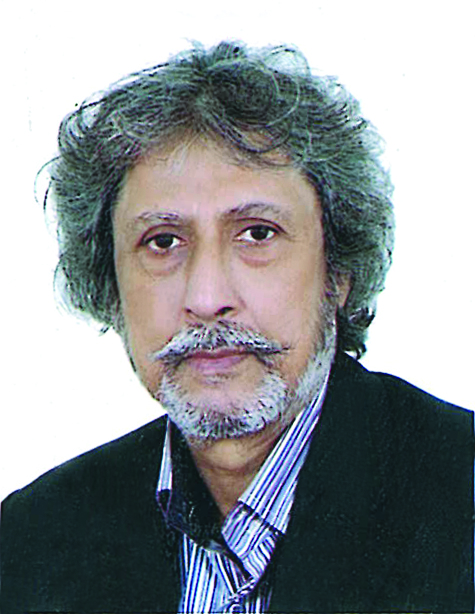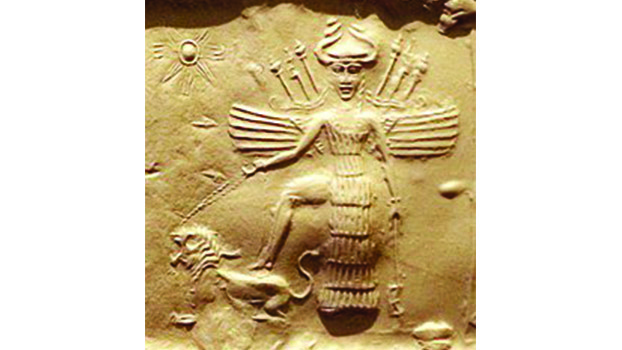Durga in other civilisations

The characteristics and persona of goddess Durga of the Hindu community as we see in Bengal can be found in similar other goddesses like Ishatar and Inanna of ancient Mesopotamia, Akkadian, Babylon or Sumer. This female deity was of highest order and revered by the people of the time. It was considered the mother goddess as well as goddess of love, war and destruction. Surprisingly, though the Sumerians, Assyrians, Babylonians and Akkadians were warrior nations, when it came to selecting chief deity they preferred the female goddess like Ishtar or Inanna.
Down the millennia this female deity has undergone changes in structure and attributes, and survived in India when the entire area of the previous civilisations of Babylon and Assyria embraced Islam and discarded idol worshipping. Details of this important deity and similar other male and female deities can be found in history books and various websites.
Here I quote from these sources:
“ Inanna is an ancient Mesopotamian goddess associated with love, beauty, desire, fertility, war, justice, and political power. She was originally worshipped in Sumer and was later worshipped by the Akkadians, Babylonians, and Assyrians under the name Ishtar. She was known as the "Queen of Heaven" and was the patron goddess of the Eanna temple at the city of Uruk, which was her main cult center.
“She was associated with the planet Venus and her most prominent symbols included the lion and the eight-pointed star. Her husband was the god Dumuzid (later known as Tammuz) and her sukkal, or personal attendant, was the goddess Ninshubur (who later became the male deity Papsukkal).
“Inanna was worshipped in Sumer at least as early as the Uruk period (c. 4000 BC – c. 3100 BC), but she had little cult prior to the conquest of Sargon of Akkad. During the post-Sargonic era, she became one of the most widely venerated deities in the Sumerian pantheon, with temples across Mesopotamia.
When we look at the name Ashur or Assurbanipal
or Kalili we tend to believe that most of the
stories of Hindu pantheon of gods and goddesses
has their roots in the ancient civilisations of Assyria,
Babylon, Akkadia and Egypt. I strongly feel scholars
and researchers should do more
research on this issue to enlighten the world.
“ The cult of Inanna-Ishtar, which may have been associated with a variety of rites, was continued by the East Semitic-speaking people who succeeded the Sumerians in the region. She was especially beloved by the Assyrians, who elevated her to become the highest deity in their pantheon, ranking above their own national god Ashur.
“Inanna-Ishtar is alluded to in the Hebrew Bible and she greatly influenced the Phoenician goddess Astoreth, who later influenced the development of the Greek goddess Aphrodite.
During later times, while her cult in Uruk continued to flourish, Ishtar also became particularly worshipped in the Upper Mesopotamian kingdom of Assyria (modern northern Iraq, northeast Syria and southeast Turkey), especially in the cities of Nineveh, Aššur and Arbela (modern Erbil).
“During the reign of the Assyrian king Assurbanipal, Ishtar rose to become the most important and widely venerated deity in the Assyrian pantheon, surpassing even the Assyrian national god Ashur.
“As Ishtar became more prominent, several lesser or regional deities were assimilated into her, including Aya (the wife of Utu), Anatu (a Semitic warrior goddess), Anunitu (an Akkadian light goddess), Agasayam (a warrior goddess), Irnini (the goddess of cedar forests in the Lebanese mountains), Kilili or Kulili (the symbol of desirable women), Sahirtu (the messenger of lovers), Kir-gu-lu (the bringer of rain), and Sarbanda (the personification of sovereignty).”
When we look at the name Ashur or Assurbanipal or Kalili we tend to believe that most of the stories of Hindu pantheon of gods and goddesses has their roots in the ancient civilisations of Assyria, Babylon, Akkadia and Egypt. I strongly feel scholars and researchers should do more research on this issue to enlighten the world.
Shahnoor Wahid is Advisory Editor of Bangladesh Post



